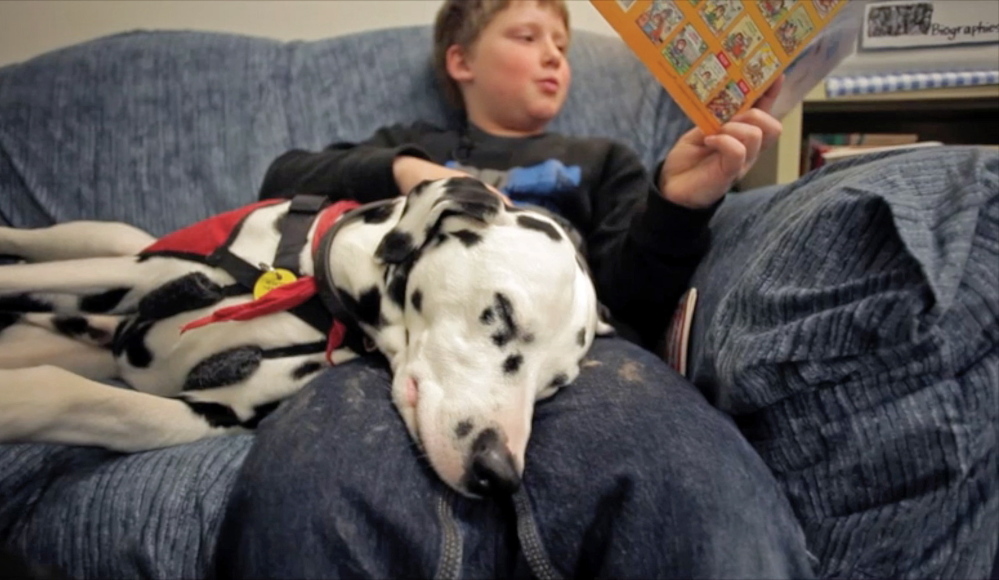Nine-year-old Sabrina Millett is curled up on an overstuffed sofa in the corner of a classroom at Harrison Elementary School.
She’s holding a book in one hand and a white paw with black spots in the other.
The book is titled “Teeny Tiny.” The paw belongs to a Dalmatian named Ghost.
Sitting next to Sabrina is Ghost’s owner, Dawn Eliot-Johnson. Sabrina reads to both Eliot-Johnson and Ghost for about 10 minutes. She’d like to sit there all afternoon, but there’s a line of other kids waiting.
In this corner of her classroom, says literacy teacher Jennifer Felt, miracles happen.
Third- and fourth-graders – who were once too anxious or embarrassed by their skill level to read out loud – are doing so with relative ease.
“When they’re over there on that couch and they’re reading with Ghost and his head is in their lap,” Felt says, “this peace and calm just comes over the whole place.”
Ghost – a champion Dalmatian who made his first appearance at the prestigious Westminster Kennel Club Dog Show in February – makes the 45-minute trip from his home in Bryant Pond to Harrison Elementary every other week during the school year. Eliot-Johnson, who works nights as a vet tech at an animal emergency clinic, has four other Dalmatians at home.
Making the long trip to Harrison is a big commitment. But the results, she says, are worth it.
“There’s one child that we had last year,” Eliot-Johnson says, “at the beginning of the year he didn’t want to read out loud. He was really self-conscious about it. He wasn’t a great reader. This year, when we went back, total change, total change.”
“I’ve seen them come out of their shell,” Felt says, “and want to take the risk, the risk to read, the risk to put themselves out there, the risk to say I may not be able to do it as well as someone else, but I’m going to try my best.”
That’s not likely to surprise Dr. Deborah Linder, a research assistant professor at the Cummings School of Veterinary Medicine at Tufts University in Boston.
In 2010, Linder and her colleagues compared second-graders reading aloud to dogs to those reading aloud to people. Each group of children read once a week for five weeks.
Researchers found that the children in the dog group showed a slight gain in ability and developed a better attitude about reading. And those kids stuck with the summerlong program for the duration, while a third of the children reading to human volunteers dropped out.
Those results mirror the findings in a larger study, involving 60 third-graders, conducted by the University of California, Davis, School of Veterinary Medicine.
Martin Smith, one of the researchers, says they found that the group of children reading to dogs saw “really strong, significant improvement in reading fluency.”
Smith says the children told them they felt more comfortable and relaxed reading to a dog.
The kids in Felt’s class feel the same way.
“You get to pat (Ghost),” says 8-year-old Brooklynn Merrill. “It makes you calm down, it doesn’t make you, like bouncy.”
“They know that Ghost and Dawn aren’t going to judge them or think less of them if they don’t know the words or they need a little extra time or help figuring them out,” Felt says.
And that, she says, builds confidence.
Not all dogs are good candidates for this job. It takes a special temperament to sit as patiently as Ghost does.
“‘Stable’ is a really good word for it,” Eliot-Johnson says. “I did a program last summer in New Hampshire. There was a camp for kids, and they wanted to have a veterinarian go in and teach them how to do checks for teeth and ears and cleaning. So (Ghost) had 20 kids listening to his heart, checking his teeth, checking his ears, trimming his nails all day long. And he was in heaven.”
Back at Harrison Elementary, 9-year-old Joshua Stultz has taken a seat on the sofa. His right arm is draped around Ghost.
“Reading to Ghost helps me focus a lot more when I’m reading,” Joshua says. “It’s like I don’t have any distractions or anything.”
Ghost’s eyes are closed, his head rests in Joshua’s lap.
“I do tell them if he falls asleep you did a fantastic job,” Eliot-Johnson says, smiling.
Ghost also helps kids who may be good readers but are too shy to read out loud.
Eliot-Johnson and Felt can relate to that. Both were painfully shy growing up, and neither was comfortable reading out loud. They know what a difference this dog is making.
“We have a lot of kiddos who don’t have a lot of opportunities in our area,” Felt says. “So for Dawn to want to come and offer this opportunity to them is truly amazing.”
“It’s such a gift. It really is a gift,” she says, with tears in her eyes.
A lifelong gift.
The kids in Felt’s literacy class aren’t just honing their reading skills. They’re beginning to experience the pure joy of reading – of picking up a book and losing themselves in a whole new world.
On the sofa in the corner, Sabrina Millett gets to the last page of “Teeny Tiny” and gives Ghost one final pat on his stomach.
“I wish they could come every day,” Sabrina says. “I would love that.”
Send questions/comments to the editors.



Comments are no longer available on this story